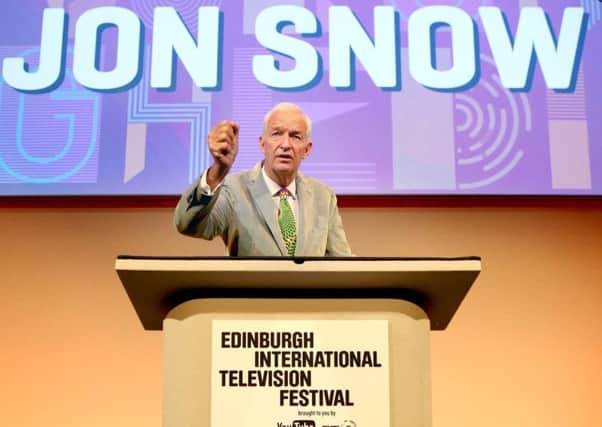John McLellan: Journalism dead? You know nothing, Jon Snow


Now veteran news anchorman Jon Snow has joined the fightback against the duopoly, saying in his impassioned McTaggart Lecture at the Edinburgh International TV Festival that Facebook and Google have “decimated the market in digital revenue that many hoped would sustain quality journalism for years to come”.
No one in the British news industry will disagree with his demand that “Facebook needs to pay more taxes; Google needs to pay more taxes, the rest too”. It is a question, he said, of making them “pay more to carry professional journalism”.
The coming storm
Advertisement
Hide AdAdvertisement
Hide AdFrom where he was speaking in the bustling Edinburgh International Conference Centre, you wouldn’t have thought that television is facing the same crisis with which print journalism has been wrestling for the best part of 20 years. The centre teemed with metropolitan hipsters up for an annual jamboree at their employers’ expense – something which has long become history in the rest of the UK media world.
Many of these bright-eyed delegates from TV production will not yet have felt the same pain felt in much of journalism. But it has, as Snow correctly said, never been easier to be a broadcaster. “We have travelled from the typewriter to the iPad, from film to smart card, from three hours to record a transmissible image to three nanoseconds,” he said.
This is not lost on the digital giants. For broadcasters like ITV and Snow’s Channel 4, the problem will soon not just be Google and Facebook scooping up advertising pounds and dollars on the back of others’ content, but the likes of Amazon and BT moving more aggressively into broadcasting, too.
Using their buying power to corner even more live sport potentially poses as great a threat to terrestrial “traditional” commercial TV operations as the duopoly has to print. In many cases, it will be more a means for these companies to market their other services than for its own sake. Yet for production people it could be a digital Klondike.
Journalists, meanwhile, face the prospect of more enormous echo chambers for fake news. “It’s a privilege to be in the midst of a revolution that can yet deliver liberation,” Snow enthused, “but which if wrongly addressed can lead to a terrible tyranny of untruth.” Which presumes the new broadcasters will care whether something is untruthful or not. Obviously, we all hope they do.
The tax question
It was no surprise that Snow was on side with calls for proper taxation of digital giants and for ways to be found to monetise content, but like the rest of us he failed to suggest how this might be done quickly and effectively. Long gone are the “build it and the adverts will come” days when free access and audience growth was seen as the only key to success in the digital age. Wresting cash from the giants who have stolen the golden advertising and marketing geese is now the name of the game.
It really wasn’t much help for Snow to say “it cannot be beyond the bounds of human understanding” to devise a system that makes them pay for the content they carry. But then he’s a journalist not an ad man, so that’s perhaps unfair.
There is still hope that audiences will pay in significant numbers for quality digital content, but even journalists have long recognised that that’s much harder in a UK dominated by the BBC. But having taken aim at all the other problems facing British journalism, the continuing distortion of the UK’s news markets by licence-fee funded free BBC services was not something such a powerful advocate of public service broadcasting was ever going to address, even if only to dismiss it.
Advertisement
Hide AdAdvertisement
Hide AdSnow was also on weaker ground when talking about what he sweepingly called “the virtual collapse of local journalism”. It may be true in London, but it is certainly not true in Scotland, or indeed Merseyside, Tyneside or Greater Manchester. His admittedly moving testimony about the tragedy of Grenfell carried his performance but strayed into such generalisations.
Perhaps it is complacent, but I’m not so sure that such loud alarm bells would have been ignored in cities like Glasgow and Edinburgh, where a strong local press remains hungry for news in a market every bit as competitive as it was 25 years ago. It would, for example, come as a surprise to the editors of the Daily Record, Glasgow Evening Times or Edinburgh Evening News, all titles with strong campaigning histories, that they did not act upon the concerns of the dispossessed to challenge authority.
This is not to say that publications with a strong local remit will exist forever – the migration of advertising, loss of newspaper sales and staff reductions are real enough – just that Snow spoke emotionally without the evidence to back it up. London has a particular shortage of local journalism compared to other parts of the UK. There are slightly over 160 newspapers covering Scotland’s 32 local authorities, for example, while London has about half that number for 33 authorities – not to mention about double the population.
“The UK, unfed by local journalists, becomes ever more dependent upon reporting what’s going on at the centre, eschewing what is happening away from it,” Snow claimed. “The absence of local reporting is merely intensifying what’s happening.”
“Unfed”, “absence” – these are unqualified words, chosen for effect rather than accuracy. In a speech about truth and reliability from an undoubted giant of British TV news you’d expect something more, shall we say, reliable.
But as befits the modern TV newsman/showman, it was as much about the spectacle and the packed Lennox Suite audience loved it all. And even though the London media elite was accused of being distant and elitist by one of its high priests, the least the faithful could do was give him a standing ovation.